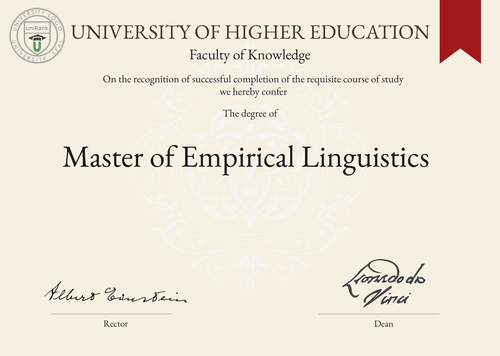
Master of Empirical Linguistics (MEL)
Guide to Master of Empirical Linguistics Program/Course/Degree
Master of Empirical Linguistics (MEL)

Program Name:
Master of Empirical LinguisticsProgram or Degree abbreviation:
MELDuration range:
1-2 yearsTuition range:
Varies by country and universityOverview:
The Master of Empirical Linguistics program is designed to provide students with a comprehensive understanding of the empirical methods used in linguistic research. This program combines theoretical knowledge with practical skills to equip students with the tools necessary to analyze and interpret linguistic data.Curriculum Overview by year:
- Year 1: Introduction to Linguistic Research, Statistical Analysis in Linguistics, Corpus Linguistics, Experimental Design in Linguistics. - Year 2: Advanced Topics in Empirical Linguistics, Data Collection and Analysis, Research Project.Key Components:
- Theoretical foundations of linguistics - Empirical research methods - Statistical analysis techniques - Corpus linguistics - Experimental design and data collection - Research projectCareer Prospects:
Graduates of the Master of Empirical Linguistics program can pursue various career paths. They can work as research assistants, data analysts, language consultants, or continue their studies at the doctoral level. Employment opportunities can be found in academia, research institutions, language technology companies and government agencies.Salary Expectations:
Salary expectations for Master of Empirical Linguistics graduates vary depending on factors such as location, industry and level of experience. On average, professionals in this field can expect a competitive salary that ranges from $40,000 to $80,000 per year. For a more accurate understanding of salary expectations, you can utilize the Job Sites Search Engine, from our sister site jobRank, which searches over 4,600 job sites worldwide. Make sure to specify not only the job title but also the country you are interested in.Conclusions:
It is important to note that the duration, tuition fees, curriculum, key components, career prospects and salary expectations of the Master of Empirical Linguistics program can vary based on the chosen country or location of study, as well as the specific university offering the program. Prospective students are encouraged to research and compare different universities and countries to find the best fit for their academic and career goals. Visitors interested in pursuing a Master of Empirical Linguistics degree can use the uniRank World Universities Search Engine to explore universities worldwide that offer this specific degree. This search engine provides a comprehensive database of universities, allowing individuals to find the right program in any location around the globe.World Universities Search Engine
search for Master of Empirical Linguistics (MEL) and add the Location (country, state etc.) or specific University you are interested in studying at.
Query examples:
- Master of Empirical Linguistics (MEL) United States
- Master of Empirical Linguistics (MEL) United Kingdom online
- Master of Empirical Linguistics (MEL) Australia international students
- Master of Empirical Linguistics (MEL) University of California
- Master of Empirical Linguistics (MEL) University of London tuition fees
- Master of Empirical Linguistics (MEL) University of Sydney scholarships
Share Program/Course
Interesting? Share this program/course/degree info with your friends now.